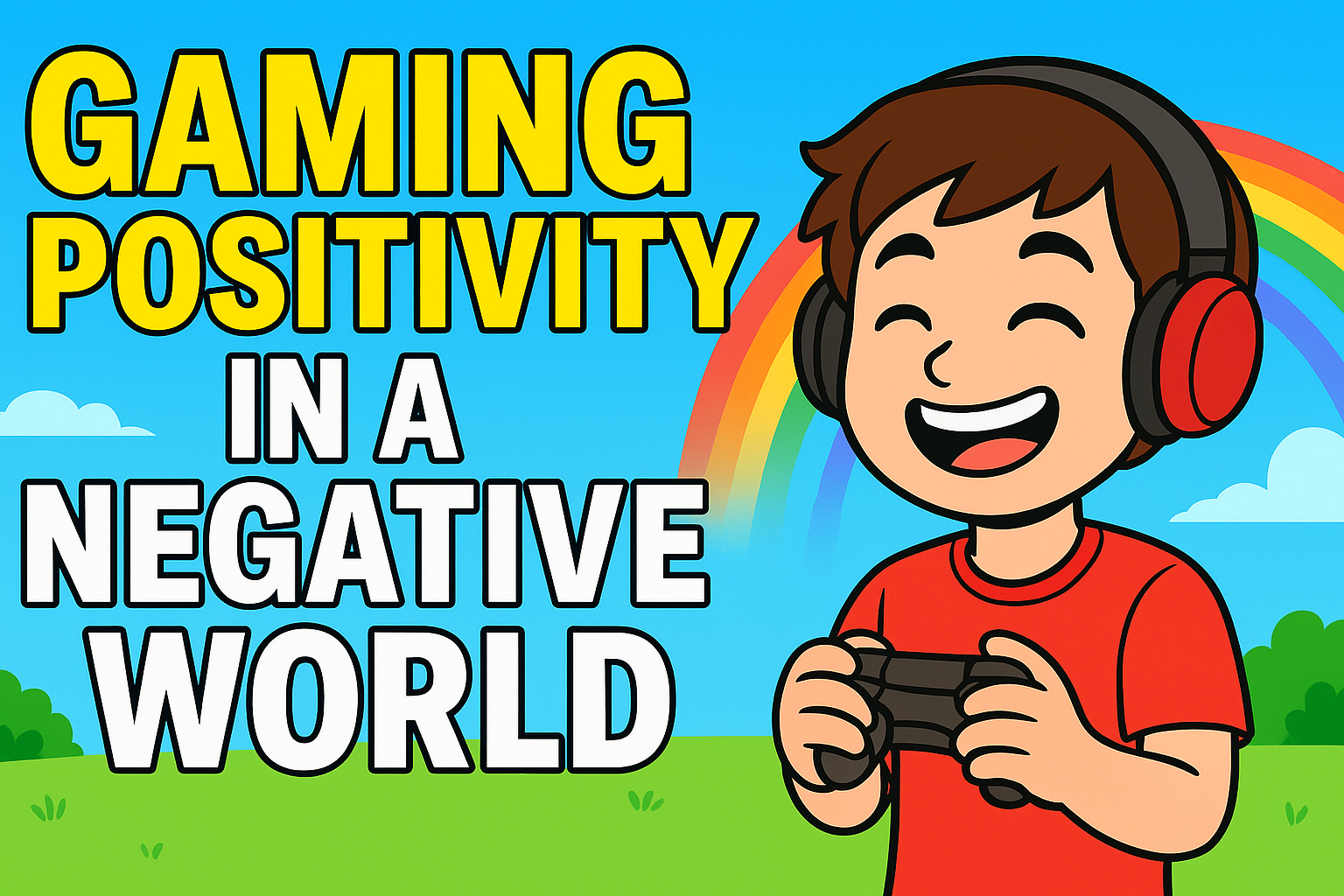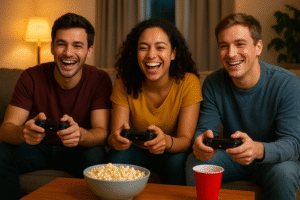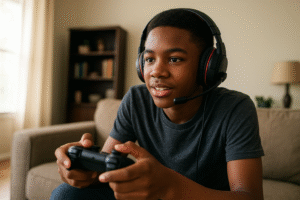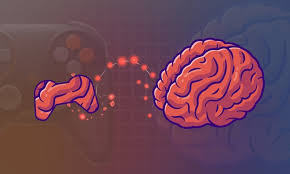Introduction: Escaping the Noise
Let’s be honest — it feels like the world has been stuck on hard mode for a while now. Open the news and it’s political drama. Scroll through social media and it’s arguments, negativity, and enough hot takes to power a nuclear reactor. Even conversations in real life sometimes feel like people are competing to be the most stressed-out person in the room.
But here’s the thing: in a world full of negativity, gaming is a bright spot.
For millions of people, games aren’t just a way to kill time — they’re a lifeline. They help us de-stress, connect, explore, and feel joy. In a sense, video games have become one of the most positive cultural forces in a world that badly needs more positivity.
And today, we’re going to dive into why.
Gaming as the Ultimate Stress-Reliever
Life is stressful. Bills, work, school, traffic, that one relative who insists pineapple doesn’t belong on pizza — it all adds up. That’s where gaming comes in.
Science Says So
Multiple studies have shown that playing games can reduce cortisol levels (the stress hormone) and boost dopamine (the “feel good” neurotransmitter). In other words: gaming literally rewires your brain to chill out.
-
Action games like Call of Duty or Overwatch 2 let players release tension by shooting digital enemies instead of yelling at their boss.
-
Cozy games like Stardew Valley, Animal Crossing: New Horizons, and Disney Dreamlight Valley let you step into peaceful, charming worlds where the biggest problem is whether you planted enough pumpkins.
-
Story-driven games like Cyberpunk 2077: Phantom Liberty or Final Fantasy XVI immerse you so deeply that your real-life worries melt away for hours at a time.
Gaming gives you something that’s hard to find in the real world: control. You can’t always control your boss or the economy, but you can slay that boss, craft that weapon, or build that dream farm.
Gaming as a Portal to New Experiences
Let’s be real: most of us won’t explore the rings of Saturn, slay dragons, or lead an army of misfit soldiers into battle. But in games? Those dreams are one controller click away.
-
In Starfield, you can explore thousands of planets, build your ship, and become a space explorer.
-
In Elden Ring, you can test your skill against godlike bosses in a fantasy world that feels alive.
-
In Microsoft Flight Simulator, you can literally fly anywhere on Earth — from your own house to the pyramids of Egypt.
-
In The Sims you can live ten different lives, with ten different careers, all before breakfast.
Games let us try things we may never experience in real life. They spark imagination, build empathy, and make the impossible feel possible.
Friendships Forged Through Pixels
One of the most underrated positives of gaming? Community.
Gaming isn’t a solitary hobby anymore. It’s social, connected, and global. Millions of friendships — even marriages — have been formed because two people happened to join the same lobby or guild.
Squad Goals
Think about Fortnite, Helldivers 2, Apex Legends, or Valorant. These games aren’t just about winning; they’re about teamwork. You rely on others, they rely on you, and in that process, bonds form.
Lockdown Lifeline
Remember 2020? When the world shut down, Animal Crossing: New Horizons became more than a game. It was a place where people celebrated birthdays, weddings, and graduations virtually. It kept us connected when real-life connection wasn’t possible.
Lifelong Friends
Many gamers have online friends they’ve never met in person but trust more than some real-life acquaintances. That’s powerful. Games break down borders, time zones, and even language barriers.

Opportunities Through Gaming
Gaming isn’t just a hobby — it’s a gateway to opportunities.
-
Careers – From Twitch streamers to esports professionals, entire industries now thrive on gaming. A teenager playing Fortnite today could be an esports champ tomorrow.
-
Creative Outlets – Modding communities, fan art, TikToks, and YouTube edits all spring from gaming. For many, this creativity leads to careers in design, video editing, or storytelling.
-
Skill Building – Strategy games sharpen problem-solving. MOBAs like League of Legends improve teamwork. Even Among Us teaches you about communication and (sometimes) lying convincingly.
And let’s not forget accessibility. Adaptive controllers and inclusive design are helping people with disabilities experience gaming like never before — giving opportunities for connection that didn’t exist even a decade ago.
Celebrating the Golden Era of Gaming
Negativity online makes it easy to forget how good we have it. Right now, in 2025, we are living in the golden era of gaming.
-
Baldur’s Gate 3 brought back old-school RPGs in style.
-
Palworld combined Pokémon-like collecting with survival crafting and became a meme sensation.
-
Helldivers 2 showed how fun co-op chaos could be when it embraced humor and teamwork.
-
The Legend of Zelda: Tears of the Kingdom let players build anything — from airships to death machines — in an expansive open world.
And that’s not even touching indie hits like Hades II or cozy masterpieces like Unpacking.
If you can’t find a game you love right now, the problem isn’t the industry — it’s that you haven’t looked hard enough.
How Gaming Spreads Positivity
Okay, so how exactly does gaming cut through negativity? Here’s the breakdown:
1. Shared Joy
Posting a funny clip, sharing a screenshot, or talking about your favorite character sparks conversations — often way more positive than arguing about politics.
2. Escapism (The Healthy Kind)
Escaping into a game isn’t avoiding reality — it’s giving yourself a mental reset. Just like movies, books, or music, gaming provides perspective and relief.
3. Building Empathy
Games like Hellblade II tackle mental health. Others like Life is Strange explore identity, grief, and friendship. Walking in someone else’s shoes (literally) builds understanding.
4. Teamwork & Cooperation
Unlike social media arguments, multiplayer games reward collaboration. You don’t win Overwatch matches by trolling your own team. You win by supporting, strategizing, and working together.
A Call to Gamers: Be the Light
The world is already full of negativity. Gaming doesn’t have to be. In fact, gaming can be the antidote.
Here’s how you can contribute:
-
Celebrate what you love instead of dunking on what you hate.
-
Lift up smaller creators and indie developers.
-
Treat people in games the way you’d want to be treated.
-
Remember that behind every username is a real human being.
If we can do that, gaming can remain the positive, powerful force it was always meant to be.
Final Thoughts: Gaming as Hope
In a world that feels divided, uncertain, and sometimes overwhelming, gaming gives us something rare: hope.
Hope that things can get better. Hope that we can connect, create, and find joy. Hope that we can face the challenges — digital or real — and come out stronger.
The next time someone tells you gaming is a waste of time, remind them:
-
Gaming can lower stress.
-
Gaming can build friendships across the globe.
-
Gaming can open doors to careers, creativity, and opportunity.
-
Gaming can give people joy when they need it most.
In a negative world, gaming is a positive light. And that’s something worth celebrating.








